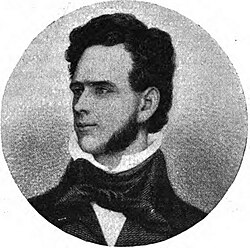Edward Pollock
Appearance

Edward Pollock (September 2, 1823 Philadelphia – December 13, 1858) was an American poet best known for writing "The Parting Hour" in 1857.
Life[edit]
He worked as a child in a cotton factory. He apprenticed with a sign-painter. In 1852, he moved to San Francisco, California,[1] and became a contributor to the Pioneer magazine. He studied law and was admitted as an attorney at the California Supreme Court in 1866. He died in 1865[2]
In his book A First Book of Jurisprudence for Students of the Common Law he wrote:[3]
There is no way by which modern law can escape from the scientific and artifical character imposed on it by the demand of modern societies for full, equal and exact justice.
Works[edit]
- Edward Pollock (1876). James F. Bowman (ed.). Poems. J.B. Lippincott & Co.
References[edit]
- ^ Western Literature Association (1987). A Literary history of the American West. TCU Press. ISBN 978-0-87565-021-0.
- ^ Ella Sterling Mighels (1893). The story of the files: a review of California writers and literature. Cooperative printing co. ISBN 9780598279521.
- ^ Pound, Roscoe (1908). "Mechanical Jurisprudence". Columbia Law Review. 8 (8): 605.
